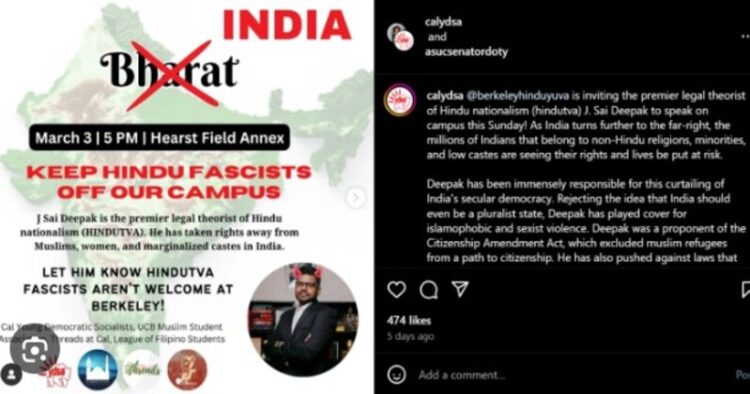In an era of globalisation, where education has become a powerful tool for the exchange of ideas, cultures, and perspectives,. The exchange is not always smooth, as different cultural values may clash within the boundaries of academic institutions itself. The same happened in the incident that involved J Sai Deepak. The occurrence highlighted the challenges that are faced by individuals for advocating cultural pride and identity in a Western educational setting.
During a speech at a US university, J Sai Deepak encountered with anti-Hindu slogans from a group of protesters. Instead of surrendering to the interference, Deepak responded by chanting “Jai Shri Ram,”. It is a slogan that has deep cultural and religious importance for the Hindus. The event quickly gained attention on social media and blazing discussions about freedom of expression, cultural sensitivity, along with the role of universities in encouraging an inclusive environment.
Critics argue that Western universities, despite their claims of promoting diversity, often grow biases against certain cultural and religious perspectives. J Sai Deepak used the term “cesspool” which is a metaphorical contamination/ disease within these institutions, where a claimed ideological dominance crushes other smaller voices.
Freedom of Expression or Selective Tolerance
Universities often promote free thinking and expression. However, these types of incidents involving J Sai Deepak raise questions about whether this freedom is truly extended for all angles. It is being argued that some ideologies receive partial treatment while others face censorship or criticism. Making a balance between the principles of free expression and a need for respectful communication is a delicate task which universities should look for.
In shaping the beliefs, values, and perspectives of future generations, there is no doubt that universities play a vital role. It is essential for institutes to promote critical thinking so that they provide a space for the open exchange of ideas and beliefs. However, the incident with J Sai Deepak prompts a reflection on whether universities are fulfilling their role as unbiased platforms for intellectual exploration or whether they are inadvertently contributing to excluding certain voices.
Cultural sensitivity should be a crucial aspect that aims to maintain a harmonious environment that makes people feel inclusive. While universities aim to create spaces that embrace diversity, incidents like the one involving J Sai Deepak reveal that there is still work to be done.
An integral part of the education system should be to promote understanding and respect for diverse cultures and belief systems so that it can foster an environment where students and speakers feel valued regardless of what their cultural background is.
With social media being the king these days, incidents like the one involving J Sai Deepak quickly gain attention and spark widespread discussions among the audiences. Moreover, these cases act and become like a combat zone where people indulge in promoting their ideologies, express their opinions and share information. The impact of social media cannot be underestimated as it can shape public opinion and influence the narrative revolving around cultural clashes in academia worldwide.
The US university incident highlights the urgency of encouraging constructive dialogue between different cultural and religious perspectives. Rather than surrendering to these clashes and slogans, it is important to have open and respectful conversations that will allow for a better understanding of multiple viewpoints. It should be the duty of universities to encourage such dialogues and create spaces where individuals with different perspectives and beliefs can engage in meaningful conversations.
J Sai Deepak, a well-known Indian lawyer and speaker, has always been a supporter for the preservation and promotion of Hindu culture, values. His speeches consistently aims to answer the necessity of confronting narratives that showcase Hinduism in a negative light, emphasizing the importance of understanding of India’s culturally rich heritage. Deepak’s advocacy has not only garnered substantial support within India but beyond.
The incident involving J Sai Deepak’s response to anti-Hindu slogans at a US university prompts that the role of universities should be critical in making inclusive environments and the need for constructive and positive dialogue between different cultural perspectives. As the world becomes increasingly interconnected through globalisation, it is extremely crucial to address such types of issues. The incident serves as a call to action, requesting universities to reevaluate their commitment of diverse perspectives and to create spaces where freedom of expression is truly inclusive.














Comments